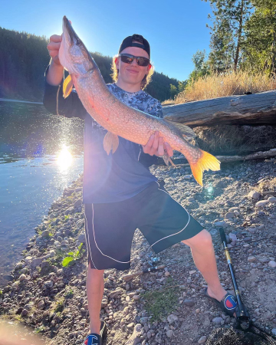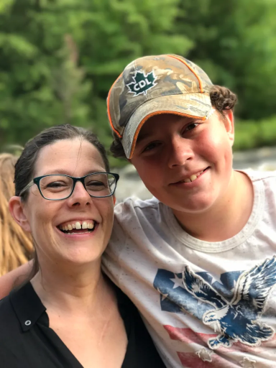By Shelby Knox, Campaign Director, ParentsTogether Foundation
This article reflects the viewpoints and experience of the contributing individual(s) and/or organizations.
Content Warning(s): Child abuse, pornographic references, self-harm and suicide.
The stories and images included in this post have been shared with permission.
Parents of Meta’s child sextortion victims are at a breaking point with the company’s refusal to take this growing crime seriously and protect their kids and others. We are organizing a national End Meta Sextortion Day of Action on Tuesday, Aug. 27 to demand the tech company address the serious crime flourishing on Facebook and Instagram.
Sextortion Thrives on Meta’s Facebook and Instagram
Sextortion is a serious and sometimes deadly crime that has increased more than 150% in the past couple of years. New research from Thorn found 1 in 17 kids are victims of sextortion. The crime often follows a common pattern – a predator or organized group of criminals pose as a teen and convince a victim to share sexual images. The criminal then blackmails the victim for money – often called financial sextortion – or more images – often called sexual or image-based sextortion. While any type of sextortion can happen to anyone, data shows financial sextortion impacts more teen boys, and sexual sextortion impacts more tween and teen girls.
Recent analysis of data from the National Center for Missing and Exploited Children (NCMEC) by Thorn found Instagram was the number one platform where sextortionists meet kids, as well as the top platform where these predators threaten to share and actually share the images of the kids they are blackmailing. Facebook too, has a long history of connecting children with sextortionists.

Sextortion is a serious crime, and by not taking it seriously and continually failing to put real prevention in place, Meta is putting thousands of kids at risk of exploitation, abuse, and even death. The parents who have experienced this harm firsthand have had enough.

When Meta Ignored Grieving Parents’ Requests to Meet, They Fought Back
ParentsTogether Action, a national parent advocacy organization with more than 3 million members, organizes and supports parents who have been directly harmed by social media, including parents of sextortion victims. In 2023, we sent Meta executives a meeting request signed by parents whose children were sextorted on Facebook or Instagram. Many of these families lost their children to suicide following their sextortion and Meta’s slow or nonexistent response. We shared this letter with three executives at Meta several times over the course of nearly two years, but the company refused to even respond to these grieving families.
The children lost to sextortion on Facebook and Instagram were beloved by their families. One mom Mary Rodee remembers her son Riley as the life of the party – a joyful, funny kid who loved sports and dreamed of a job in environmental conservation. His young life was tragically cut short at just 15 when a criminal sextorted him on Facebook. He died from suicide six hours after the criminal found him online. Similarly, Jen Markus lost her son Braden, a gifted and hard working athlete, a mere 27 minutes after a predator found him on Instagram and blackmailed him over intimate photos. Their stories are unfortunately echoed again and again across America.
At ParentsTogether, we also support dozens more families whose children survived their ordeal of being targeted and exploited by predators on Facebook and Instagram. They understandably wish to keep their children’s identities private as they heal from their trauma, but share the same determination to prevent this type of abuse from happening to other families.

Meta Has Slowed Sextortion Response and Put The Onus of Prevention Onto Kids
Instagram and Facebook have also significantly delayed and slowed reporting sextortion on their platform, a key element of effective response. A couple years ago, Meta platforms were reporting sextortion to NCMEC within a week on average. More recently, that response time has ballooned to over a month for Facebook and nearly two months for Instagram.
This delay is deadly. Many children, including Waylon, Riley, and Braden, have died minutes or hours after being sextorted on Meta properties. Long reporting delays also make it more difficult for law enforcement to follow up leads, track down criminal sextortionists, and prevent them from harming more children. The company says sextortion prevention and response is important to them, but their actions and response times tell a very different story.
Meta is failing kids not just in responding to sextortion, but in preventing it in the first place. This past spring, Instagram released what they called “sextortion prevention” tools that show just how disconnected they are from the experiences of real victims. Their solution is to blur incoming nudity and warn kids they don’t need to respond to or share that image. This approach misunderstands the basic mechanism of sextortion – criminals pretending to be peers to prey on kids’ natural curiosities, desires, and impulses. It relies on kids to overcome those powerful intrinsic motivations, use parts of their brains that haven’t fully formed, and make up for Meta’s lack of investment in solving this problem by policing these platforms themselves. Even this inadequate set of tools is full of holes – kids can turn off nudity protection and still choose to forward nude images without the subject’s consent.
These continued failures coupled with Meta’s refusal to talk to parents directly impacted by sextortion inspired parents to create a Day of Action to Stop Meta Sextortion.

How to Participate in the Day of Action
You can check out the End Meta Sextortion Day of Action toolkit here and share widely.
If you’re a parent … talk to your kid about sextortion and the risks of sharing nude images online. Reassure them that if they do share an image they regret, they can tell you and you’ll help them, you won’t be angry, and you won’t take their device away.
You can also watch NCMEC’s interactive video No Escape Room to understand how sextortion happens.
If you’re a victim of sextortion … you are not alone, and help is available. First, don’t panic, don’t pay the offender, and don’t delete your account. Screenshot their messages and block them on social media. You can also call your local police department and submit a report to the NCMEC CyberTipline. Take It Down helps victims remove their images from online.


